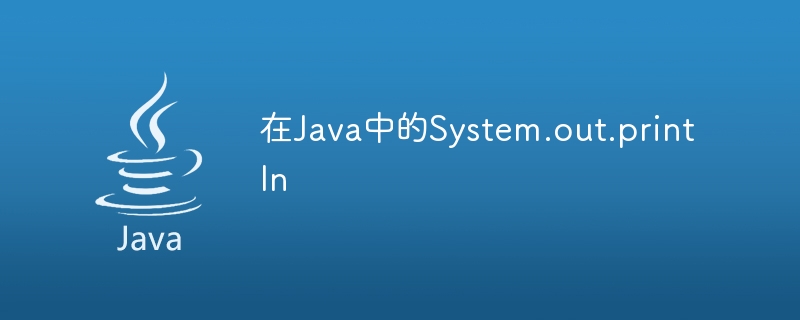Home >Java >javaTutorial >System.out.println in Java
System.out.println in Java
- 王林forward
- 2023-09-20 23:13:023001browse

Introduction
System.out.println is a method in Java that prints a message to standard output (usually the console) appending a newline character. It is widely used to display messages, data and results of operations during program execution. This approach is critical for understanding code flow and debugging potential issues.
Decomposition System.out.println
System.out.println may seem like a simple method, but it's worth understanding its components to get a better grasp of how it works.
System− Built-in classes in the java.lang package. It cannot be instantiated and provides access to the standard input, output, and error streams as well as other system-related functions.
out − Static member of the System class representing the standard output stream. It is an instance of the PrintStream class and is responsible for writing data to the output stream.
println − A method of the PrintStream class that writes a message to the output stream and appends a newline character. It can be overloaded to handle various data types such as integers, floats, characters, strings, and even objects (by calling their toString() method).
usage
Using System.out.println is simple. You can call it from your code with a value or expression as argument and it will print the result to the console.
Example
Let's see an example to understand its usage -
public class Main {
public static void main(String[] args) {
int a = 5;
int b = 10;
System.out.println("Hello, world!");
System.out.println("The value of a is: " + a);
System.out.println("The sum of a and b is: " + (a + b));
}
}
Output
When you run the program, the output will be -
Hello, world! The value of a is: 5 The sum of a and b is: 15
illustrate
In the above code, we declared two integer variables a and b and assigned them the values 5 and 10 respectively.
Then we use System.out.println -
Print a simple message "Hello, world!".
Print the value of variable a.
Print the sum of variables a and b.
As you can see, System.out.println allows us to output various types of data, making it an indispensable tool for understanding the behavior of our code.
Points to Remember
Although System.out.println is a powerful debugging tool, it must be remembered that it is not suitable for every situation. In complex applications or when dealing with multi-threaded environments, using a logging framework such as Log4j or SLF4J is a more appropriate choice as it provides greater control over log levels, output formats and destinations.
in conclusion
System.out.println is an essential tool in Java, especially for beginners learning the language. It provides a simple way to output data to the console, which is valuable for understanding program flow and debugging problems. As you advance in your Java journey, you'll find more sophisticated logging and debugging tools, but System.out.println will always be a handy tool in your developer toolkit.
The above is the detailed content of System.out.println in Java. For more information, please follow other related articles on the PHP Chinese website!
Related articles
See more- what is the difference between java and javascript
- How to convert string into character array in java
- What are the eight basic data types of Java?
- How to solve javac is not an internal or external command, nor is it an operable program?
- Use the fmt.Fprintln function to write formatted data to the specified file and wrap it in a new line. If the file does not exist, create it.

